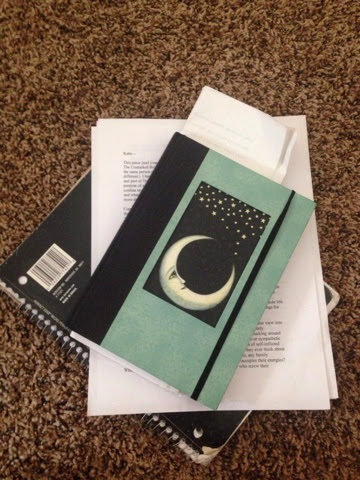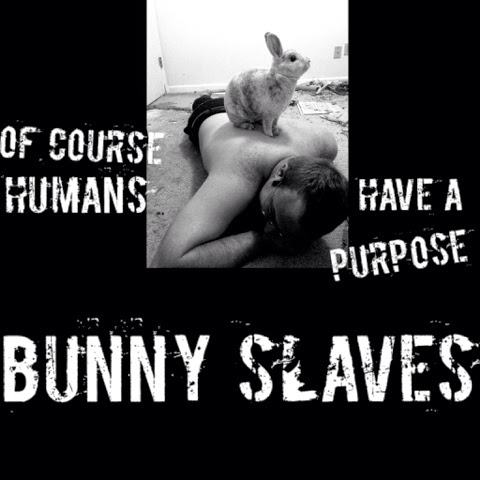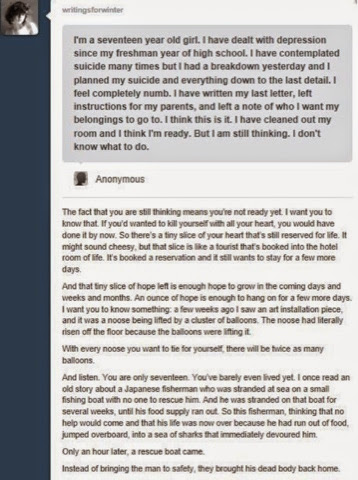First of all, I want to note, getting out of the house and doing this was an obstacle for me. I almost flaked. I hadn't made a commitment to my boss, who told me they had plenty of volunteers so it was up to me if I wanted to come. My husband initially didn't want to attend. The day before we had spent hours on hours walking around The Haunt at Kings Island and we were both exhausted -- our legs were jelly and our joints stiff. But that was just an excuse. The real reason I almost didn't go was because of my anxiety. I didn't want to go all by myself to a venue I didn't know very well to participate in an event that was sure to be very emotionally taxing. Bear in mind, I've only worked at my new job for two months at this point and I'm still trying to make friends. Going alone was a scary prospect and I think I would have chickened out if my husband hadn't finally agreed that the walk would be good to stretch our sore muscles.
"But won't it be depressing?" he asked.
Well, yeah. Sawyer Point was filled with people who had lost a loved one to suicide, or who were battling with mental illness themselves. At registration, honor beads were handed out symbolizing who you were walking for -- a color for different family members and one representing a personal battle. I didn't see the beads or know what they were for or else I would have proudly wore the latter.
My mother's favorite cousin, Wade, lost his battle with depression several years ago. I'll never forget the day my family got the phone call. I was on my way out the door when the phone rang. I stopped to make sure it wasn't for me, but I could tell by the look on my dad's face that something terrible had happened. He thanked the person on the phone and hung up, and he held my mom tight as he broke the news to her. She cried and cried. I stayed in that night. If I met Wade, I was very young and don't remember, but I heard a lot about him. He played guitar. He was a sweetheart. Just an all around cool guy to know. My mom loved him. She was crushed, angry, betrayed.
At the Walk, big tables stood at the front of the park with boxes and boxes of white paper bags and colored markers. We made a luminary for Wade.
My husband and I talked about how fortunate we were that he knows no one that has committed suicide and Wade was one of only two people that I know -- the other being a distant cousin of mine, Justin, who tragically killed himself at just 16 years old.
"But it could have been me," I said.
"In the sense that it could have been every teenager," he dismissed.
I was shocked. Did he really not know how I struggled? How I still struggle? The scars on my arm are an everyday reminder that I am alive, but only barely. Only because I couldn't get up the gumption to do it. Because I couldn't deal with the guilt of those I'd leave behind.
I remember very clearly, on multiple occasions, hugging my little dog close to me and crying in her fur and at once cursing and thanking her because she was the only thing keeping me from doing it. Which is a huge reason why I think everyone should have a pet. Like, go get one right now. Bunnies are the best. Adopt, don't shop. But I digress...
"Do you remember the phone conversation we had before we started dating, when I told you that I could see us growing old together, sitting on a porch swing with our gray hair, reading?" I asked my husband.
"Vaguely," he said.
"That was a very important realization to me. It was one of the first times that I actually saw a future for myself. I clung to that. It gave me hope."
Hope is a powerful thing for a depressed person. That was one of the things I learned as I struggled to overcome my feelings: Pick something in the future, no matter how small, and look forward to it. I still do this now. If I'm feeling super depressed, I'll plan a trip. Not for next weekend but for the future, maybe a couple months down the road. Looking forward to something gives hope. Just a small little light to cling to. It's not much, but it's something.
The Walk started right at sunset and the sky was beautiful. As we turned to finish the final leg, the city lights came out as the sky turned dark. At the very end, the luminaries awaited us, lighting our path. Not just names, but poems, drawings, letters to loved ones gone too soon. It was impossible not to get emotional.
We gathered back together in the park to listen to some survivors speak on the importance of suicide prevention and ending the stigma associate with mental illness so that people will know when they need to get help and so they won't be afraid to reach out. White balloons glowing with white lights inside them were handed out to the survivors. At their release, they dotted the dark sky with thousands of these small specks of bright, shining light floating upwards.
Behind me, a group of three young women released their three balloons, but one of the balloons dropped to the ground, sinking like a dead weight. She burst into tears, and I shook my head. "Isn't that just fitting?" I thought. "Isn't that just how it feels to battle depression and mental illness? Like a sinking fucking balloon in a beautifully moving, successful balloon release with all the other balloons floating upwards, all happy and shining." I got her tears, I understood. I would have been bawling myself. The metaphor was obvious. To her, that balloon was her friend, her loved one that she was there representing. Her friends snatched their balloons out of the air quickly, holding onto their strings, and they hugged her close to them while she cried.
"But isn't it something," I noted to my husband. "All of these people here tonight are fighting for someone they don't know. So that someone they don't know will see that suicide is not the answer. So no one else will hurt like they hurt in their mourning. Or better yet, so no one else will hurt like their loved ones hurt. So they can get help and get better."
It seems so easy. It's not only fighting for funding for research. It's fighting to change someone's mind. End the stigma. Get help. Choose life. Stay.
There's too much beauty to quit. And this night was filled with beauty.
The AFSP's Out of the Darkness Walk in Cincinnati raised over $93,000, well beyond their goal of $75,000. Yesterday, the restaurant I manage participated in an event called Dining for Dollars. For every guest that turned in a Dining for Dollars voucher, we will donate 10% of their bill to the American Foundation for Suicide Prevention. We had a successful day and raised about $215 in our restaurant alone. Pair that with the other eight restaurants in our region and we made a substantial contribution. That is definitely something to be proud of!
The AFSP's Out of the Darkness Walk in Cincinnati raised over $93,000, well beyond their goal of $75,000. Yesterday, the restaurant I manage participated in an event called Dining for Dollars. For every guest that turned in a Dining for Dollars voucher, we will donate 10% of their bill to the American Foundation for Suicide Prevention. We had a successful day and raised about $215 in our restaurant alone. Pair that with the other eight restaurants in our region and we made a substantial contribution. That is definitely something to be proud of!
If you'd like to help suicide prevention, please consider making a donation. If you are unable to make a donation, please help end the stigma with open discussions about mental illness. And if you are in crisis, please call 1-800-273-TALK (and plan a trip with your pet)!








